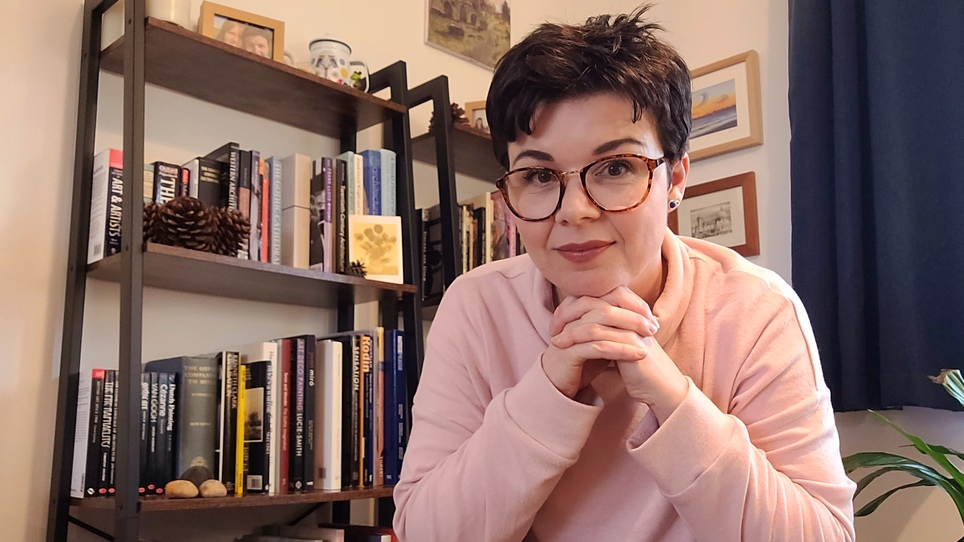Rosalind's story
#NowIKnow Rosalind's story…
It was my job that enabled me to realise that I am autistic. It’s a job I have been in for 15 years, yet it was only last year that everything unfolded before me. I am a manager for SEND (special educational needs and disabilities) provision in a West Sussex college, all the time supporting autistic young people but never seeing it in me.
As it dawned on me last year that I could be autistic, I thought back to my childhood, my adolescence, and then my adulthood, recognising all the telltale signs that would probably be picked up now, but were unlikely to be picked up back in the 80s and 90s.
I was known as a quiet, compliant and polite child. I remember always being socially awkward, making social slip-ups, dreading social occasions but forcing myself through them.

I knew I didn’t really fit in anywhere, so I became a social chameleon, fitting in everywhere and nowhere, always feeling out of place but never giving that away. I’ve always found it hard to make conversation. I learned by copying other people, but never really knew what to do or say outside of what I copied, so my conversations were and still are limited. I don’t do small talk and will avoid it at all costs.
“I knew I didn’t really fit in anywhere, so I became a social chameleon, fitting in everywhere and nowhere, always feeling out of place but never giving that away.”
As I grew into adolescence, I remember becoming increasingly unhappy with who I was, or with the fact that I didn’t know who I was. I know this is very typical for adolescents, but because I was so socially inept, I felt very isolated. My room became my haven, my safe space. I created a space where there were beautiful pictures, colour, order and peace. I’d unwittingly worked out what soothed my senses. I liked things just so, to the point of fixation. I am still like that in my own home environment, and I am very particular about who I chose to invite in.
I always felt uncomfortable. Physically, emotionally, mentally, like I was on the periphery of the world, not quite being able to manage it like everyone else seemed to. But I pushed it all down and ploughed on through life, doing what society expected me to do. I went to university, I got married, I had children, and then I found a job that became long-term and secure. I regret none of these things: I had some very happy times and have been very blessed. However, I have fitted in, played parts and covered up my struggles, all the while feeling out of place no matter where I have been or what I’ve been doing.
Historically, I have suffered cycles of very poor mental health. At work, I had a definite pattern of crashing and burning at the end of each academic term. I thought it was depression; now I know that it was autistic burnout. I was working through very intense terms and then not only crashing at the end, but also not being able to mentally cope with the change from being intensely busy to having unstructured time.
Four years ago, my life turned upside down when my father died. I had lost my father, my friend, my hero. My ex-husband told me that when Dad died, he saw a part of me die too. He was absolutely right, not least because Dad knew me better than anyone. The one person who knew how I ticked had gone. I knew life was never going to be the same again, and after that I took some radical decisions and my life changed unrecognisably. I had to work out who I was and find my identity, or I knew that my life would continue to be only half lived.
As I moved into more senior positions within my workplace, I began to recognise real difficulties in myself with processing, verbal communication, misunderstanding things and the social demands of working with other people. I began to feel increasingly incompetent and fraudulent, and my stress levels were creeping up and up. I didn’t understand why I was finding a field I’d been working in for 15 years so hard.
In the last few years, we have started to see an increasing number of female students with an autism diagnosis. It wasn’t so much a lightbulb moment, but I had a gradual realisation and acceptance that there was a strong chance that I was autistic. I remember seeing one piece of creative work that one of our students produced and it reduced me to tears. She had just visually described me right there on the page and I couldn’t help my reaction. I knew I had to pursue a diagnosis, so I did the AQ (Autism Spectrum Quotient) test and because my results were so high, my GP agreed to refer me on for further investigation. My diagnosis was made last November.
It was incredibly hard going back over 44 years of life, identifying all my difficulties, and it has caused a lot of traumas to resurface that I now need to deal with. But I now know why I am like I am; I’m getting to know myself for the first time. I have an explanation for my social communication and processing issues, I know why I display certain behaviours and why I stim, and I better understand my sensory needs. I'm learning more every day about me, gradually giving myself permission to mask less and show more of who I really am. It’s hard, but incredible and liberating all at the same time.
“I now know why I am like I am; I’m getting to know myself for the first time. I have an explanation for my social communication and processing issues, I know why I display certain behaviours and why I stim, and I better understand my sensory needs. I'm learning more every day about me, gradually giving myself permission to mask less and show more of who I really am.”
I have some really low and difficult days, never regretting my diagnosis, but feeling despair at what it’s left me to deal with and grieve. But I also have some days where I have never felt more like me, and I glow golden inside. My partner and two daughters are also learning with me, and I am so grateful for the support and love they give: I will never underestimate that.
I actually don’t know what the future holds. I need to consider very carefully what is going to work best for me in terms of getting my work-life balance right, so that I can cope with life, have my needs met and feel fulfilled in what I do. I do know that I have to heal from everything I’ve been through, and that will take time and patience. My immediate concern is to keep my loved ones close, take the help when I need it, and be patient with myself.

